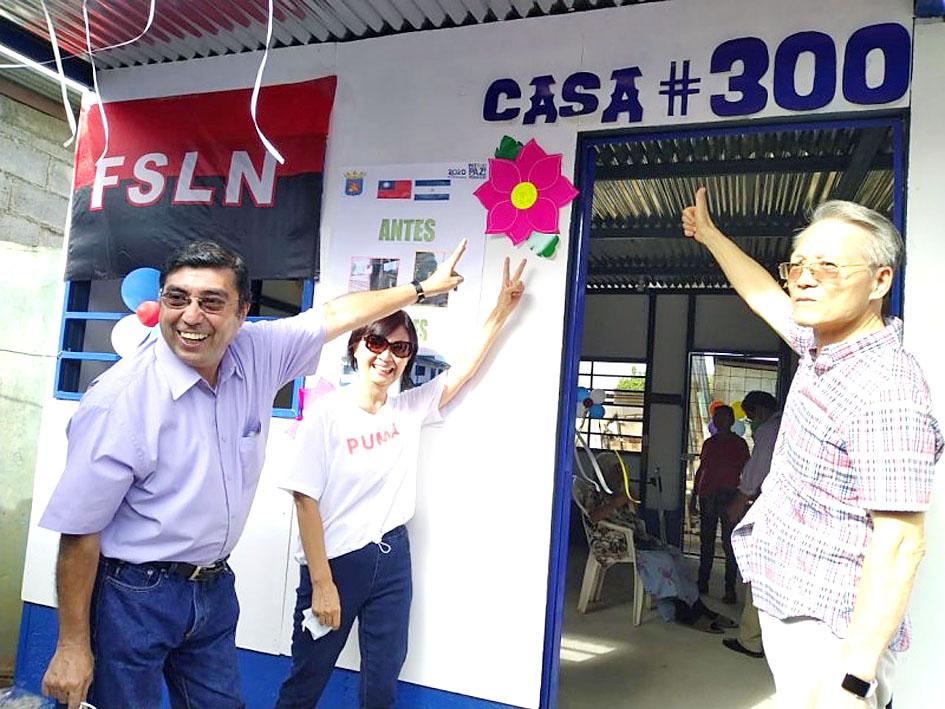Former ambassador to Nicaragua Jaime Wu (吳進木) had not informed the government of his decision to accept Nicaraguan citizenship, the Ministry of Foreign Affairs (MOFA) said yesterday, urging Wu to respond to public queries about his continued stay in the country despite the severance of diplomatic ties.
The Nicaraguan government on Dec. 9 switched diplomatic recognition from Taipei to Beijing. The following day it announced that Wu and his wife, Liu Chun-chiao (劉春嬌), were granted Nicaraguan citizenship in recognition of their contributions to the country for more than a decade.
While Wu had officially applied for retirement before the two nations cut ties, his decision to stay in the country has sparked controversy.

Photo taken from the Web site of the Republic of China embassy in Nicaragua
Wu had since 2020 applied for retirement several times and his application was approved on Sept. 28 last year, ministry spokeswoman Joanne Ou (歐江安) told a news briefing in Taipei yesterday.
However, the ministry had not been informed of his decision to receive Nicaraguan citizenship in advance, she said.
Wu had told the ministry that his wife could not travel long distances due to health issues, so the couple could not return to Taiwan for the time being, she said, adding that the ministry would not comment further on Liu’s health condition.
The ministry has contacted Wu through private channels and called on him to respond to public questions, she said.
Wu is still subject to the Classified National Security Information Protection Act (國家機密保護法), Ou said.
The ministry is holding interagency discussions regarding calls to amend the law to prevent a similar incident, Ou said.
As a former diplomat, Wu should have striven for the greater good of the nation, Democratic Progressive Party (DPP) Legislator Wang Ting-yu (王定宇) said separately in a video on Facebook yesterday.
However, his actions, including accepting Nicaraguan citizenship and staying in the Central American country after it cut ties with Taiwan, show that he has no professional ethics at all, which should be condemned by the public, Wang said.
It is questionable whether Wu did his utmost to protect the nation’s benefits and secrets during his tenure as a diplomat, he added.
The authorities should discuss whether to freeze Wu’s pension or take legal action, Wang said, urging Wu to return to Taiwan and explain his actions to the public.

Weather conditions across Taiwan are expected to remain stable today, but cloudy to rainy skies are expected from tomorrow onward due to increasing moisture in the atmosphere, according to the Central Weather Administration (CWA). Daytime highs today are expected to hit 25-27°C in western Taiwan and 22-24°C in the eastern counties of Yilan, Hualien, and Taitung, data on the CWA website indicated. After sunset, temperatures could drop to 16-17°C in most parts of Taiwan. For tomorrow, precipitation is likely in northern Taiwan as a cloud system moves in from China. Daytime temperatures are expected to hover around 25°C, the CWA said. Starting Monday, areas

A Taiwanese software developer has created a generative artificial intelligence (AI) model to help people use AI without exposing sensitive data, project head Huang Chung-hsiao (黃崇校) said yesterday. Huang, a 55-year-old coder leading a US-based team, said that concerns over data privacy and security in popular generative AIs such as ChatGPT and DeepSeek motivated him to develop a personal AI assistant named “Mei.” One of the biggest security flaws with cloud-based algorithms is that users are required to hand over personal information to access the service, giving developers the opportunity to mine user data, he said. For this reason, many government agencies and

The National Fire Agency on Thursday said a series of drills simulating a magnitude 8.5 earthquake would be held in September to enhance the government’s emergency response capabilities. Since earthquakes cannot be predicted, only by continuously promoting disaster prevention measures could Taiwan enhance its resilience to earthquakes, agency Director-General Hsiao Huan-chang (蕭煥章) said in a news release. The exercises would be held to mark annual National Disaster Prevention Day on Sept. 21, the aim of which is to test Taiwan’s preparedness and improve its earthquake resilience in case of a major temblor, Hsiao said. As part of those drills, an earthquake alert would

STRICTER ENFORCEMENT: Taipei authorities warned against drunk cycling after a sharp rise in riding under the influence, urging greater public awareness of its illegality Taipei authorities have issued a public warning urging people not to ride bicycles after consuming alcohol, following a sharp rise in riding under the influence (DUI) cases involving bicycles. Five hundred and seven people were charged with DUI last year while riding YouBikes, personal bicycles, or other self-propelled two-wheelers — a fourfold increase from the previous year, data released by the Taipei Police Department’s Traffic Division showed. Of these, 33 cases were considered severe enough to be prosecuted under “offenses against public safety,” the data showed. Under the Road Traffic Management and Penalty Act (道路交通管理處罰條例), bicycles — including YouBikes and other